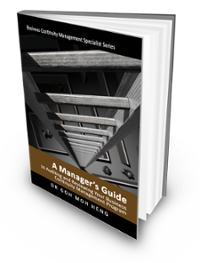Introduction
This is the outline of a typical BCM Audit course designed for BCM professionals and Auditors interested in learning more about auditing and reviewing BC Plan and program.

The purpose is to provide Heads of Audit or Audit Managers who require designing an in-house audit training course with the outline of the course. Readers who wish to attend a public course can find them at BCM Institute.
Objectives of BCM Audit Course
At the end of the course, participants will be able to:
- Describe the roles and responsibilities of a BCM Auditor
- Conduct a self-audit of BCM program and its compliance with BCM standard
Course Curriculum
General Audit Principles
Having a good understanding of:
- The need for audit
- Audit objectives and scope
- Types of audit
- Auditors’ roles and responsibility
- Auditor’s attributes
Auditing Process
- Conducting the opening meeting
- Implementing the process audit
- Applying audit methods and techniques
- Establish objective evidence
Audit Framework, Scope and Planning
- Establishing the Audit Framework
- Defining the Audit Scope
- Identifying the Audit Areas and Planning
Conducting the Audit
- Scheduling and Administration
- Developing and Designing the Interview Contents
- Avoiding Pitfalls and Known Difficulties
Analysis
- Understanding the Methods for Analysis
- Summarizing Interview Results
- Analyzing and Documenting the Results and Findings
- Applying the Standardized Program
Non-conformity Reporting
- Structuring report contents
- Rationalizing and categorizing of non-conformities
- Raising issues of non-conformity reports
- Closing out of non-conformity reports
Implementing the Standardized Audit Program
- Providing an overview of audit items
- Defining key control areas
Review and Discussion
- Completing a BCM self-assessment form
- Finalizing audit documents and results
- Revisiting critical success factors
Summary
- Planning the next action and its schedule
- Working with the organization’s BCM team
Assignments
The course assignments are an integral part of the BCM Audit Course. Participants are required to complete two assignments as follows:
- Assignment 1: Implementing the Audit Plan and Program
- Preparing the draft audit documents
- Conducting the audit
- Summarizing and reporting audit results
- Assignment 2: Using the BCM Self-Assessment Form
- Conducting a preliminary self-assessment for the organization
- Establishing compliance and non-compliance criteria
- Establishing plan action and schedule for compliance
Resource
Goh, M. H. (2016). A Manager's Guide to Auditing and Reviewing Your Business Continuity Management Program. Business Continuity Management Series (2nd ed.). Singapore: GMH Pte Ltd.
Extracted from "Appendix 13: Auditing BCM Course"
Singapore  Government Funding for BCM-8530 Course
Government Funding for BCM-8530 Course
The next section applied to Singaporean and Singapore permanent residents. Click button "Government Funding Available" to find out more about the funding that is available from the Singapore government. This include the CITREP+, SkillsFuture Credit and UTAP.
Find out more about Blended Learning BCM-8530 [BL-A-5] & BCM-8030 [BL-A-3]
 |
 |
 |
 |
![TMM [BL-A-5]](https://no-cache.hubspot.com/cta/default/3893111/e7af9322-15cb-412d-91b6-59cd388ee6e9.png) |
![Register [BL-A-5]](https://no-cache.hubspot.com/cta/default/3893111/bb38417e-6241-4057-b90c-f319f31a494e.png) |
 |
Please feel free to send us a note if you have any of these questions to sales.ap@bcm-institute.org |  |





